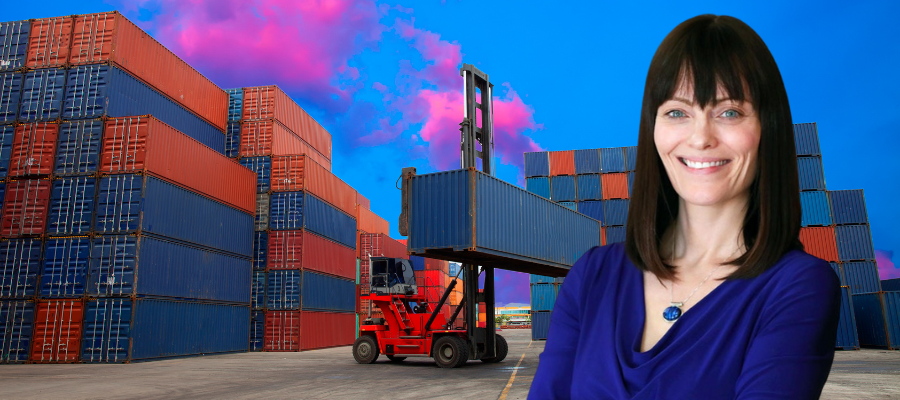🕒 Article read time: 2 minutes
2023: key focuses and challenges for logistics

Logistics has, for many decades, remained something of an enigma. Although it has always been vital for underpinning trade and commercial activity, the general public has not always been aware of how indispensable the industry is to the wider UK economy.
This changed first during Brexit and then the pandemic, which shone a spotlight on logistics – and the vital role it plays in our everyday lives – like never before.
Belfast-based Nichola Mallon, Logistics UK’s newly appointed Head of Trade and Devolved Policy, argues that it is essential that this higher public profile is not squandered, and that logistics continues to be recognised and supported as an industry that drives economic growth.
“The logistics industry is facing a number of challenges,” she said, “and having recently joined Logistics UK myself and having been out meeting members, some of the key challenges I will be focusing on this year are the Northern Ireland Protocol, skills and decarbonisation.”
NORTHERN IRELAND PROTOCOL
It is now more than three years since the UK officially left the European Union, yet the Northern Ireland Protocol remains unresolved.
“Since joining Logistics UK, I have had several meetings with senior ministers and political figures to discuss the Protocol and represent the views and needs of our members,” Mallon said.
The cast list of politicians and officials she has discussed the issue with is long and impressive, including the Foreign Secretary, The Rt Hon James Cleverly MP; the Secretary of State for Northern Ireland, Chris Heaton-Harris MP; Minister of State for Northern Ireland, Steve Baker MP; Leader of the Labour Party, Keir Starmer; Taoiseach, Leo Varadkar and French Ambassador, Hélène Duchêne.
In each of these meetings, she consistently maintained that the sector needs an agreed deal on the Protocol that builds on the benefits and reduces the administrative and cost burdens on businesses moving goods from Great Britain to Northern Ireland. This can be achieved, she argued, by maximising Trusted Trader Schemes and digital solutions.
“Listening to and led by our members, I will continue to press both the EU and the UK Government for a negotiated outcome on the Protocol that delivers stability, certainty, simplicity and affordability; and one that is tested with logistics businesses to ensure it works in the real world.”
SKILLS
The logistics industry has seen a continued skills shortage and has been working tirelessly to train and recruit a new workforce to plug the gaps and keep supply chains protected. Last summer, Logistics UK, in partnership with the Chartered Institute of Logistics and Transport, led the launch of a ground-breaking skills campaign – Generation Logistics. Focused on bringing together the sector to help solve its skills and labour shortages, the campaign is backed by the Department for Transport, logistics businesses and trade associations.
While Generation Logistics is a long-term solution to attracting the next generation of talent into the industry, Mallon argues that a short- to medium-term labour boost is also essential. As a result, in December 2022, Logistics UK urged the government in Westminster to add forklift drivers, HGV drivers – of which there is an estimated shortage of 60,000 across GB and NI – and warehouse operatives to the Shortage Occupation List in relation to the Skilled Worker Visa, as well as ensuring mechanics remain on the list.
“Working in partnership with government departments to address the skills gap, attract new and younger people, male and female, into the logistics industry and retain existing workers – for which improved drivers' facilities are vital – will remain a clear focus in the months ahead,” she said.
DECARBONISATION
With the deadline for reaching net zero by 2050 edging ever closer, decarbonisation is a high priority for all operators within the logistics sector. Routes to reducing carbon emissions include transitioning to alternatively fuelled, zero emission vehicles (ZEVs) and ultral-low emission vehicles (ULEVs). Implementing electric vehicle (EV) infrastructure is also vital to help businesses transition their fleets over to EVs in line with the 2030 phase out date for the sale of new petrol and diesel vehicles.
Key concerns remain, however, surrounding charging infrastructure and power supply availability. There is also significant variation in provision across the UK. Figures released by the Department for Transport show that Northern Ireland operators still face some of the worst challenges, with the lowest number of public electric charging devices per 100,000 of population. The figure for Northern Ireland stands at just 18, compared to 122 for London and an average of 60 for Scotland. Plus, these numbers do not account for whether the charging devices are suitable for commercial vehicles, which need larger bays, increased height restrictions and longer charging cables.
Operators are also facing increased financial pressures as a result of rising inflation and operating costs. Further vehicle acquisition costs and charges for upgrading power supply at depots, as well as depot chargepoint installation, are creating additional financial strain for operators.
“The logistics sector is committed and willing to make the transition to net zero,” Mallon said, “but we need clarity from government on alternative fuels, investment in charging infrastructure and financial support and incentives for businesses to make this costly transition.”
PROGRESS BEING MADE DESPITE CHALLENGES
Mallon believes that while many challenges remain within the logistics industry, there is much progress being made and opportunities to be seized, particularly through collaborative working between government and industry.
“Although extremely complex, logistics is an adaptable and resilient industry and there is a willingness to communicate among each other, and with government to ensure the best possible solutions are found,” she said, “I look forward to the year ahead and working with colleagues from across Logistics UK, the wider industry and senior stakeholders to continue making progress and ensuring practical and achievable solutions are found.”
*www.logistics.org.uk/campaigns
Published On: 16/02/2023 16:00:41

Comments Section
If you are a Logistics UK member login to add comments.